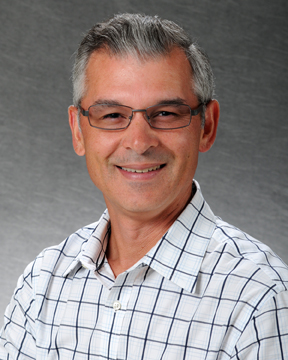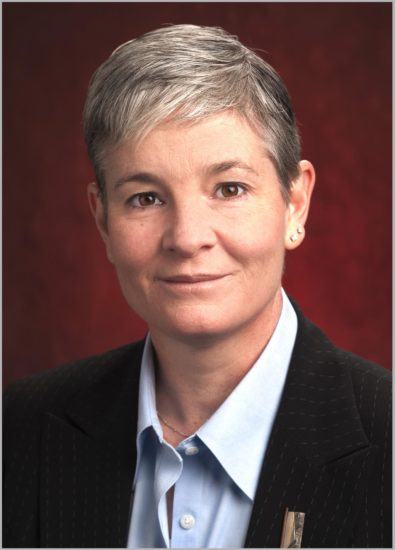David B. Buller

Bio: Dr. David Buller is a Senior Scientist and Director of Research at Klein Buendel, Inc., a health communication research company in Golden, Colorado. He received his PhD in Communication from Michigan State University. Formerly, Dr. Buller was a Professor of Communication and Director of the Behavioral Sciences Section in the Arizona Cancer Center at the University of Arizona (1986-1997), a Senior Scientist at AMC Cancer Research Center (1997-2002); and the Harold Simmons Chair for Health Communication at the Cooper Institute (2002-2005). For over 25 years, Dr. Buller has tested health communication strategies in disease prevention, most notably for skin cancer prevention. Dr. Buller evaluated interventions for improving occupational and recreational sun protection, promoting policy change in schools and workplaces, and using purpose-built shade, smart phones, and social media to improve sun protection and reduce indoor tanning. In this work, he coauthored the Sunny Days, Healthy Ways primary and secondary school curriculum, the Sun Safe School school policy intervention, the sunZapp mobile app, and the Go Sun Smart and Sun Safe Workplaces occupational policy and education programs. He has also studied technology-based interventions for community tobacco control, smoking cessation, nutrition education, human papillomavirus vaccine uptake, and responsible sales practice interventions for the alcohol and recreational marijuana marketplaces. In the area of dissemination and implementation of evidence-based programs, Dr. Buller has studied the scale-up of occupational sun protection interventions nationwide in the snowsports and transportation industries and has brought to market the Way To Serve® responsible beverage service training. Dr. Buller’s health communication research has been funded by the National Cancer Institute, National Institute on Alcohol Abuse and Alcoholism, National Institute of Allergy and Infectious Diseases, Eunice Kennedy Shriver National Institute of Child Health and Human Development, National Institute on Drug Abuse, National Institute on Minority Health and Health Disparities, Centers for Disease Control and Prevention, Environmental Protection Agency, and Arizona and Colorado state governments. He is a past chair of the National Institutes of Health’s (NIH) Community Influences on Health Behavior Study Section and has served as a permanent member of four NIH study sections. Dr. Buller’s health communication work has been recognized by awards from the American Public Health Association, Kentucky Conference on Health Communication, and Colorado Cancer Coalition. He is a fellow of the Society of Behavioral Medicine. He has published over 195 books, chapters, and articles on his research.
Carma Bylund
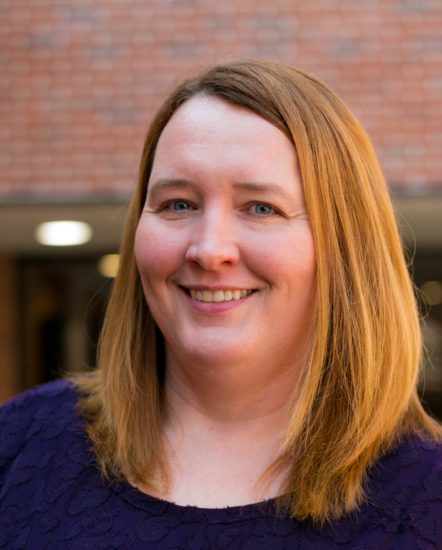 Bio: Dr. Carma Bylund is associate professor in the Department of Public Relations with an additional appointment in the STEM center and in the Division of Hematology & Oncology, College of Medicine. Dr. Bylund is a behavioral scientist with international expertise in healthcare communication. Her research spans the cancer continuum from prevention to survivorship. Dr. Bylund’s research collaborations have resulted in more than $5 million in grant funding, primarily from the National Cancer Institute.
Bio: Dr. Carma Bylund is associate professor in the Department of Public Relations with an additional appointment in the STEM center and in the Division of Hematology & Oncology, College of Medicine. Dr. Bylund is a behavioral scientist with international expertise in healthcare communication. Her research spans the cancer continuum from prevention to survivorship. Dr. Bylund’s research collaborations have resulted in more than $5 million in grant funding, primarily from the National Cancer Institute.
Dr. Bylund has published 89 peer-reviewed journal articles, 20 book chapters and is co-editor of two Oxford books. Dr. Bylund was previously Director of the Communication Skills Training and Research Laboratory at Memorial Sloan Kettering Cancer Center in New York City, NY, where she co-developed the Comskil Model for communication skills training. Following, she was Associate Director for Medical Education at Hamad Medical Corporation in Doha, Qatar, where she led the dissemination and evaluation of the Comskil Model for teaching in a multi-cultural environment.
Dr. Bylund is a fellow in the American Academy on Communication and Healthcare. She teaches graduate level courses: Communication in Healthcare and Systematic Review Methods.
Margaret F. (Mardie) Clayton
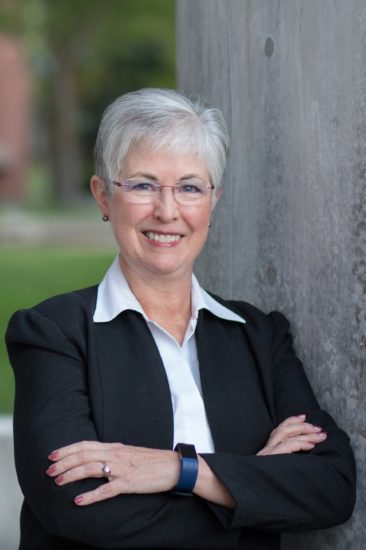
Keywords: cancer communication; cancer survivorship; hospice care
Bio: Margaret F. Clayton PhD, FNP-BC, FAAN I am a Professor in the College of Nursing with an Auxiliary Faculty appointment in the Department of Communication at the University of Utah. I have been a Huntsman Cancer Institute Investigator (HCI) in the Division of Cancer Control and Population Sciences since 2007. My sustained contributions as an interdisciplinary nursing scholar uniquely integrate nursing and communication science to inform understanding of the vital role of communication from cancer survivorship through end-of-life. Most recently I am the site PI for an NIA funded R21 study (1R21AG060017-01): Standardized PatiEnt-CenTered medicatiOn Review (SPECTORx) in Home Hospice collaborating with nurses and physicians from UMass Medical School. This study addresses the management of medications during home hospice care with an eye to caregiver burden. I am a Co-Investigator on a Program Project Grant under review (PI Mooney; Project lead Ellington); Project 2, Patient and Caregivers Together: Communication and Stress Response in Advanced Cancer (PACT), part of the Program Project Grant (PPG) Rethinking Cancer Caregiving Stress: A dynamic approach to optimizing personalized support for family caregivers (Rethink Study). The PACT project is a prospective observational longitudinal study that extends our previous investigation of communication during life limiting cancer to include stress process links to caregiver health and well-being. As a collaborating scientist I have investigated hospice nurse–cancer caregiver communication as part of a completed NCI funded multisite longitudinal PPG (P01CA138317; PI Mooney), finding that communication primarily addresses physical care of the patient with little attention to caregiver physical and emotional needs. In other research I serve as a consultant for The Breast Cancer Treatment Symptom Experience, Management and Outcomes According to Race Study (SEMOARS) 1R01MD012245-01; M. Rosenzweig PI. In intramural research I am the PI for a study investigating Live Patient Discharge From Hospice: Implications For Families And Hospice Staff and a Co-I for the Me in We Intervention: Development and Feasibility Pilot for Advanced Cancer Patients and their Family Caregivers that is evaluating a goal setting approach for patients with life limiting cancer and their caregivers. Complementing my research expertise, I have 25+ years of clinical nursing experience and am a board certified Family Nurse Practitioner.
Doug Evans is a Professor of Prevention and Community Health, and of Global Health, and Director of the Public Health Communication and Marketing Program.
Dr. Evans has published widely on the effectiveness of social marketing and behavior change interventions in various subject areas and global settings. His current research focuses on the use of branding strategies in public health and the development and evaluation of new health technologies including mobile health. In 2008, he published the volume, Public Health Branding, and is currently finishing a second book, Global Social Marketing Research, both from Oxford University Press. Dr. Evans is currently a member of the Secretary of Health and Human Service’s National Advisory Committee on Health Promotion and Disease Prevention (Healthy People 2020). He is also an expert panel member for the health marketing and health communication review of the Guide to Community Preventive Services. Dr. Evans consults on numerous global health programs, including branding of condom use and condom social marketing programs in Africa, Asia, and Eastern Europe and former Soviet states in collaboration with USAID and World Bank funded programs. He is currently consulting with USAID on evaluation of mobile health programs in Russia. Dr. Evans currently is Principal Investigator (PI) of a grant from the Department of Defense to evaluate the text4baby mobile health intervention for Military Health Service (MHS) populations. The text4baby program uses an evidence-based protocol of text messages to promote healthy pre-natal neonatal parenting behaviors and is targeted to the needs of low-income women with limited access to health information. He also has funding from the Healthy Mothers Healthy Babies Coalition (HMHB) to evaluate text4baby in the predominantly Spanish-speaking immigrant population of Fairfax County, Virginia in collaboration with Fairfax Department of Health. He is also PI of a 5-year grant from the Department of Health and Human Services to evaluate an innovative repeat teen pregnancy prevention demonstration project, currently being implemented in the District of Columbia. The project uses video-training and social media in a strengths-based intervention that targets Parent-Child Connectedness (PCC) to improve life skills. Dr. Evans is also an investigator in the Center of Excellence in Health Disparities Research, funded by the National Institute on Minority Health and Health Disparities. He is an investigator on the Patient-Centered Outcomes Research Institute (PCORI) funded study entitled “Testing Message Frames About the Preventive Services Task Force.” Finally, he is the PI of a National Institute on Drug Abuse funded Small Business Innovation Research (SBIR) grant entitled “Behavioral Brand Builder,” which is developing a prototype online health branding education tool for health and health care professionals.
Shelia Murphy

Dr. Sheila Murphy is a Full Professor at the Annenberg School for Communication and Journalism at the University of Southern California. Trained in social psychology, Dr. Murphy specializes in identifying the individual, interpersonal, community, ethnic and cultural level factors that shape people’s knowledge, attitudes and practices. She is also an expert on the use of stories or narratives – in contrast to more traditional interventions – to change individual and normative beliefs and behavior on topics ranging from human trafficking, condom use, stereotyping, cancer screening, water conservation, and acceptance of marginalized groups such as Muslims, undocumented immigrants and transgender individuals.
For the past 25 years, Dr. Murphy has designed and/or evaluated persuasive interventions using a wide variety of methodological tools including experiments, large-scale surveys, focus groups, content analysis, social network analysis, multilevel analysis and field observation in order to paint a more complete picture of a particular problem.
Dr. Murphy has received the American Public Health Association’s Public Health Education Award, The Top Translational Research Award in Health Communication and the National Institutes of Health Common Fund Award. For her work on persuasive narrative Dr. Murphy recently received the 2015 Everett M. Rogers Award given to “an individual who has made an outstanding contribution to advancing the study and/or practice of public health communication” by the American Public Health Association. 1n 2018, Dr. Murphy was elected a Fellow of the International Communication Association for her achievements in the study of human communication.
Xiaoli Nan

Dr. Xiaoli Nan is Professor and Co-Director of Graduate Studies in the Department of Communication and the Director of the Center for Health and Risk Communication at the University of Maryland. Dr. Nan’s research is broadly concerned with health and risk communication, focusing on a) the design of persuasive messages to influence health risk perceptions and behaviors and b) the role of traditional and emerging media in promoting (and hindering) public health. Dr. Nan’s research addresses the basic processes of human judgment and decision making related to health risks and the implications of these processes for effective risk communication. Her work prioritizes several health domains including cancer control, vaccination, food safety and nutrition, and climate change. Dr. Nan has published extensively in her areas of specialization with over 60 peer-reviewed journal articles. She has been a Principal Investigator or Co-Principal Investigator on grants awarded by the National Institutes of Health, the Department of Energy, the Food and Drug Administration, the Department of Agriculture, and the Department of Homeland Security, totaling over $7.5 million. Dr. Nan is the Vice Chair of the Health Communication Division of the National Communication Association and a senior editor of the academic journal Health Communication.
Samantha R. Paige
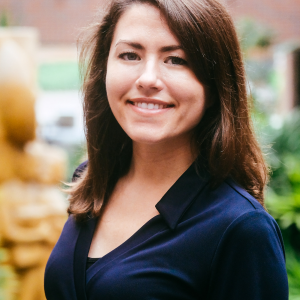
Keywords: eHealth literacy; computer-mediated communication; chronic obstructive pulmonary disease; screening; rural health disparities
Bio: Samantha R. Paige, PhD, MPH is a transdisciplinary mixed-methods researcher in the STEM Translational Communication Center at the University of Florida. She specializes in eHealth literacy and health message design interventions to combat rural health disparities among adults at-risk or living with tobacco-associated lung diseases (e.g., chronic obstructive pulmonary disease, lung cancer). Broadly, her research considers the role of technology and computer-mediated communication in the uptake of evidence-based treatment and diagnostic procedures. As a predoctoral fellow, her research on technology-assisted COPD self-management was funded by the University of Florida’s Clinical and Translational Sciences Institute and the Society for Public Health Education. Her dissertation research and training in eHealth literacy and COPD was also funded by a Ruth L. Kirschstein National Research Service Award (NRSA) Individual F31 Predoctoral Fellowship with the National Heart, Lung, and Blood Institute (NHLBI). Currently, she is funded by an NRSA Individual F32 Postdoctoral Fellowship with the NHLBI to develop precision messages that promote the early detection of COPD among rural Floridians.

